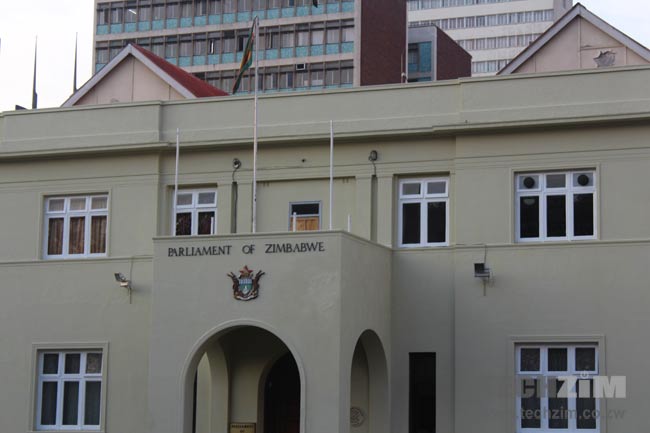Parliamentary Sittings in February 2020
Both Houses of Parliament resumed sitting on Tuesday 11th February after a six weeks’ recess. They met again last week and will continue this week, with sittings from Tuesday 25th February.
This bulletin starts with a brief indication of the Order Paper for this week and then outlines what happened in both Houses over the last two weeks. A separate bulletin will cover recently gazetted Acts and Bills.
Coming up in the National Assembly This Week
Privileges Committee Report on Corruption Allegations against MPs
This is item 1 on the agenda. As the accused MPs have had the opportunity last week to reply to the report presented last week by the chairperson of the Privileges Committee, Senator Chief Charumbira. Now Chief Charumbira will reply to their responses.
Bills
Marriages Bill Continuation of the Second Reading debate is item 2 on the agenda. For progress made over the last two weeks, please see below.
Freedom of Information Bill and International Treaties Bill These are items 3 and 4 on the agenda – for continuation of Second Reading proceedings that have already started.
Veterans of the Liberation Struggle Bill, Constitutional Court Bill and Zimbabwe Media Commission Bill These are items 5, 6 and 7 on the agenda – all these Bills are awaiting presentation of the explanatory Ministerial speeches to begin their Second Reading stages.
Other business
Motions Listed on the agenda immediately after the above Bills, are almost thirty motions are listed for presentation or further consideration. These include ten new ones specifically asking the National Assembly to take note of and/or adopt Portfolio Committee reports on a large variety of subjects. Another is the motion calling for the abolition of the death penalty that was presented on 18th February although it is now way down the Order Paper
Question Time will be on Wednesday afternoon.
Coming up in the Senate This Week
Senate
Senators have no Bills to consider. The only Government business on the agenda is made up of five international agreements for approval of ratification or signature in terms of section 327 of the Constitution. These agreements have already been approved by the National Assembly:
(1) Joint Convention on the Safety of Spent Fuel Management and on the Safety of Radioactive Waste Management;
(2) Convention On the Physical Protection of Nuclear Material and Nuclear Facilities;
(3) Convention on Assistance in the Case of a Nuclear Accident or Radiological Emergency;
(4) Convention on the Physical Protection of Nuclear Material and Nuclear Facilities;
(5) Convention on Early Notification of a Nuclear Accident.
Motions: Other agenda items involve continuing debate on motions carried over from last year, including the motion on the President’s speech opening the session and the motion applauding SADC’s resolution against sanctions.
Question Time will be on Thursday.
In the National Assembly since 11th February
Marriages Bill [link] – Second Reading debate in progress
The Second Reading stage of this Bill began on Tuesday 11th February, continued on Thursday 13th and Tuesday 18th February and is still to be completed.
The Minister of Justice, Legal and Parliamentary Affairs opened proceedings with a brief speech [link] outlining the purpose of the Bill and confirming that, in accordance with the Cabinet decision to drop clause 40 on Civil partnerships, he would be seeking the deletion of that clause during the Committee Stage. Hon Mataranyika, chairperson of the Portfolio Committee on Justice, Legal and Parliamentary Affairs, then presented the committee’s report [link] on the public hearings around the country [held by it and other committees] and in written submissions from received from members of the public. The report contains a number of recommendations for changes to the Bill. Contributions from individual MPs followed. These included detailed and helpful contributions from Hon Biti and Hon Gonese.
Education Amendment Bill to go to President minus Senate Amendment
This Bill is a hangover from the previous Parliamentary session, at the very end of which, on 26th September 2019, the National Assembly voted to reject outright the Senate’s deletion of the words “sexual and” from clause 14(k)’s provision for the appointment of “sexual and reproductive health personnel” in schools. This effectively stalled progress on the Bill pending possible resolution of the disagreement between the Houses.
In the present session, the Bill was duly restored to the Order Paper by vote of the National Assembly on 12th November, along with five other unfinished Bills that had lapsed at the end of the previous session. No more was heard until 13th February, when the National Assembly – without any debate – approved a motion, presented by the Minister of Justice, Legal and Parliamentary Affairs, that the the Bill “as passed by the National Assembly on 27th August 2019, be presented to His Excellency the President for assent and signature in accordance with provisions of paragraph 6 of the Fifth Schedule of the Constitution of Zimbabwe on disagreement between Houses”. What this means is that the Bill will go to the President – and probably be gazetted as an Act – without the Senate amendment, i.e. including the words “sexual and” to which Senators took such strong objection.
In other words, the National Assembly resolved the impasse by overriding the Senate. So, the Bill provides a rare example of the National Assembly’s use of its power to do so if a disagreement over a Bill is not otherwise resolved in the 90-day period beginning when the Bill was introduced into the Senate [Constitution, Fifth Schedule, paragraph 6(1)]. Day 1, in this case, was 28th August 2019 – so the Minister, in fact, waited for more than the required 90 days before presenting last Thursday’s motion.
The Bill will now go to the President for assent and gazetting as an Act despite the Senate’s objection.
International Treaties Bill [link]
On 20th February the Minister of Justice, Legal and Parliamentary Affairs delivered the Second Reading speech explaining the need for and purpose of this Bill. Hon Paradza then presented the report on the Bill prepared by the Portfolio Committee on Foreign Affairs and International Trade. The report welcomed the Bill in principle but criticised it on points of detail and called for many amendments. Debate was then adjourned.
Other Bills given their First Readings and sent to the PLC
The following three Bills were given their first readings on 12th February and immediately referred to the Parliamentary Legal Committee, where they are still under consideration:
Forest Amendment Bill [link]
Financial Adjustments Bill [link] [critically discussed in Bill Watch 66/2019 [link]
National Prosecuting Authority Amendment Bill [link].
Privileges Committee Report on Corruption Allegations against MPs
On 18th and 20th February, The House resumed consideration of the report by the Privileges Committee chaired by Senator Chief Charumbira. The committee was appointed to inquire into allegations of solicitation of a bribe against four MPs. [Reminder: The report presented in December 2019 – see Bill Watch 67/2019 [link] – concluded that the MPs had not been proved to have solicited a bribe, but that they had conducted themselves in a manner creating an impression of impropriety by meeting the complainant outside Parliament and at night and should be disciplined for that.]. The MPs concerned now had their chance to put their side and protested vigorously and at some length against the privileges committee’s “grossly unreasonable” adverse findings on impropriety, complaining that they had not been afforded an opportunity to respond to the new charge of impropriety and that the committee’s report did not specify which standing orders or rules it believed had been infringed. Committee chairperson Chief Charumbira still has to reply to the debate.
Ministerial Statement on Corona Virus
MPs requested a Ministerial Statement on the country’s preparedness in relation to the Corona Virus. On 20th February the Minister of Health and Child Care obliged [link], and was afterwards asked to clarify several points.
Motion for abolition of death penalty
On 18th February Hon Dorcas Sibanda [MDC-A] presented her motion calling on “the Executive” to abolish the death penalty, in a short but impassioned speech urging all Parliamentarians to become abolitionists and support her campaign. Hon Kindness Paradza [ZANU PF] seconded the motion, and several MPs then contributed to the debate, with those supporting the motion outnumbering slightly those who supported retention of the death penalty for such as the current machete killers and those who rape and kill small children. Debate was then adjourned.
Comment: As Veritas has pointed out in many bulletins, the Constitution leaves it to the Legislature – meaning Parliament and the President – to decide whether or not to maintain the death penalty. A short and simple Act of Parliament could abolish it by repealing the relevant provisions of the Criminal Law Code and the Criminal Procedure and Evidence Act. It is not necessary to amend the Constitution. Hon Sibanda and Hon Paradza were, therefore, right when they said the death penalty could simply be abolished by legislative measures to remove it from the statute book.
Petition to Parliament for Act on Independent Complaints Mechanism as required by Constitution, section 210
On 20th February the Speaker announced that the Portfolio Committee on Defence, Home Affairs and Security Services would consider a petition from Mr E.T. Zimudzi asking Parliament to enact legislation providing for an Independent Complaints Mechanism as required by section 210 of the Constitution.
Comment: Bravo Mr Zimudzi! Perhaps Parliament can be relied on to venture into territory where the Executive has feared to tread – and the Constitutional Court has for four years now, without explanation, failed to give judgment in a straightforward case brought by Veritas asking the court to order the Government to comply with section 210 of the Constitution by taking a Bill to Parliament [Rashid Mahiya v Minister of Justice, Legal and Parliamentary Affairs et al, CCZ 42/15].
In the Senate since 11th February
The Senate has had no Bills to consider so far this year, something that may change when Bills start coming up from the National Assembly, probably not until next month. This state of affairs resulted in short sittings, with Senators continuing their contributions to debates on motions previously presented.
Veritas makes every effort to ensure reliable information, but cannot take legal responsibility for information supplied.
Post published in: Featured














 Jordan Rothman is a partner of
Jordan Rothman is a partner of 




 The airline’s Boeing 767 was impounded last year in South Africa due to outstanding debts. Photo: Getty Images
The airline’s Boeing 767 was impounded last year in South Africa due to outstanding debts. Photo: Getty Images